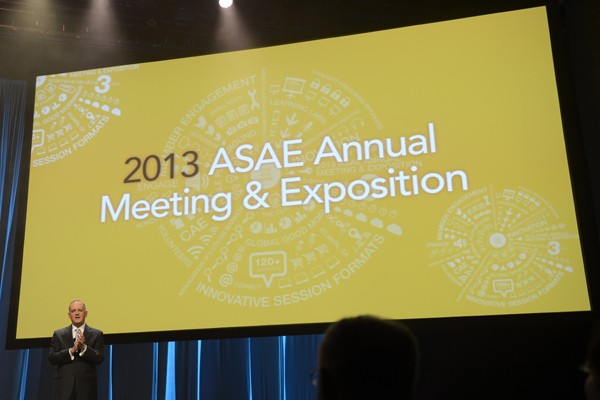ASAE meeting: government cuts and tax issues still nettlesome
ASAE meeting: government cuts and tax issues still nettlesome
- August 6, 2013 |
-
 tarallo
tarallo

Latest executive-plus-exhibitor attendance estimates for the Aug. 3-6 conference in Atlanta up from last year
ASAE CEO John Graham speaks at the Georgia World Congress Center, site of the 2013 ASAE annual meeting, held Aug. 3-6 in Atlanta.
|
ATLANTA—At their annual meeting here on Monday, ASAE officials touted attendance estimates that reflected an uptick from last year's meeting, but also spoke of issues that continue to trouble associations.
Estimates as of Monday morning (day two of the Aug. 3-5 meeting) showed 2,896 association executives attending, compared with last year's "day two" estimate of 2,773 executives. "This is a great attendance for us," ASAE CEO John Graham said at a news conference at the Georgia World Conference Center, where the meeting is being held.
Graham attributed the increase, in part, to Atlanta's accessibility, especially for large number of attendees from Washington and Chicago, a relatively short flight away.
If the estimates hold, executive attendance at this year's ASAE meeting is the highest in five years. However, it is still considerably short of the 3,124 record set at the 2008 meeting in San Diego.
This year, exhibitor attendance is down slightly: 1,807, compared with 1,859 last year, according to ASAE aides. This brings combined executive and exhibitor attendance this year to 4,703, vs. 4,593 last year.
ASAE places attendees who do not fit into the two main categories (such as volunteers, spouses, etc.) in a third category, ‘other.' But since these are not paid attendees, ASAE says it pays little attention to this third category ("It's not something we're going to evaluate or actually worry about," Graham said), whereas the main two categories are closely watched.
The attendance figures were warmly greeting by Atlanta officials, who are hoping to lure some association executives into booking a future meeting in the city. Historically, roughly 20 percent of annual meeting attendees later book a meeting in the host city, according to ASAE estimates.
"As you can imagine, that makes this meeting even more exciting for us," William Pate, president and CEO of the Atlanta Convention and Visitors Bureau, said at the news conference.
In addition, about two-third of this year's attendees have never been to a meeting in Atlanta, Pate said, so the CVB is hopeful that some will be impressed enough to return. "That is all upside for us," Pate said.
Pate said Atlanta is the fourth-largest convention market in the U.S., in terms of available convention space. The top three are Chicago, Orlando and Las Vegas, CVB aides said.
Will UBIT mean OBIT for some associations?
Of the challenges currently facing associations, one is a relatively new wrinkle on a threat that ASAE perennially warns its members about: a tax reform effort by Congress that could strip away their tax exempt status.
At Monday's news conference, however, Graham focused not so much on the possibility of groups losing the exemption outright, but on potential changes in taxable revenue rules.
Currently, revenue from several forms of common association activities such as trade shows, sponsorships and affinity programs is not taxed. But Graham said there have been reports out of the main tax committees in Congress (House Ways and Means and Senate Finance) that some lawmakers want to explore amending tax rules so associations would be liable for unrelated business income tax, or UBIT, for these activities.
"This is an issue they want to look at," Graham said.
In this matter, the "elephant in the room" is AARP, he added. That massive organization has an estimated $900 million not subject to UBIT, and some lawmakers see that as a potential revenue source for the government, Graham said.
On the meetings front, some groups are still struggling with the impact of recent travel restrictions on government officials, which has meant fewer appearances by federal representatives at association meetings. The restrictions are the result, in part, of sequestration and budget cuts that have compelled federal agencies to cut travel budgets.
"It really has put a dark cloud over federal employees travelling," Graham said.
Association meetings, Graham said, are key venues for the "appropriate exchange of information between the private sector and public sector," and the restrictions greatly harm this valuable transfer of knowledge.
And while ASAE and others continue to lobby against the restrictions, the problem will likely not go away anytime soon, because of the government's ongoing need to find new revenue.
"It's a tough issue," Graham said, "because the deficits and the budget cuts are real."
For more coverage of the ASAE's annual meeting, see the next print issue of CEO Update.

